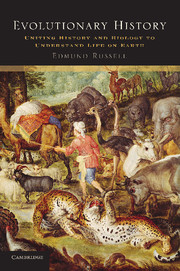Book contents
- Frontmatter
- Contents
- Figures
- Tables
- Preface
- Acknowledgments
- 1 Matters of Life and Death
- 2 Evolution's Visible Hands
- 3 Hunting and Fishing
- 4 Eradication
- 5 Altering Environments
- 6 Evolution Revolution
- 7 Intentional Evolution
- 8 Coevolution
- 9 Evolution of the Industrial Revolution
- 10 History of Technology
- 11 Environmental History
- 12 Conclusion
- Note on Sources
- Glossary
- Notes
- Index
3 - Hunting and Fishing
Published online by Cambridge University Press: 05 June 2012
- Frontmatter
- Contents
- Figures
- Tables
- Preface
- Acknowledgments
- 1 Matters of Life and Death
- 2 Evolution's Visible Hands
- 3 Hunting and Fishing
- 4 Eradication
- 5 Altering Environments
- 6 Evolution Revolution
- 7 Intentional Evolution
- 8 Coevolution
- 9 Evolution of the Industrial Revolution
- 10 History of Technology
- 11 Environmental History
- 12 Conclusion
- Note on Sources
- Glossary
- Notes
- Index
Summary
If you and I were to travel to the South Luangwa National Park and the adjacent Lupande Game Management Area in Zambia, we would likely keep our eyes peeled for elephants. For every ten elephants, we would expect to see six with tusks and four without (Figure 3.1). Those of us familiar with Asian elephants, but not African, might come up with a reasonable explanation: the park harbors a few more male elephants than females. And indeed, in Asian elephants, males bear tusks and females do not. But those of us familiar with African elephants will reject that hypothesis, for both males and females grow tusks in Africa. Historically, almost all adult elephants bore tusks. Tusklessness is an inherited genetic trait, and it has become more common, so elephants in Zambia fit our definition of an evolving population of a species.
Tuskless elephants illustrate one argument of this chapter: by selectively harvesting animals, human beings have altered the traits of populations of wild species; that is, we have pushed their evolution in certain directions. We will see similar processes affecting other animals in mountains, plains, and seas. In most of these examples, people have altered the traits of populations without encouraging new species to arise. The modern plains bison of North America, on the other hand, might be an example of changing a population's traits so radically we consider it to have become a new species.
- Type
- Chapter
- Information
- Evolutionary HistoryUniting History and Biology to Understand Life on Earth, pp. 17 - 30Publisher: Cambridge University PressPrint publication year: 2011



